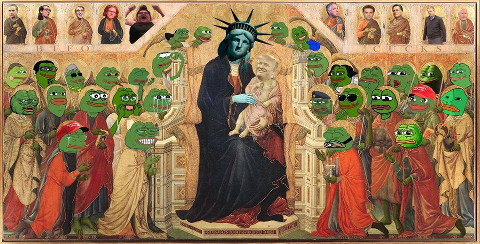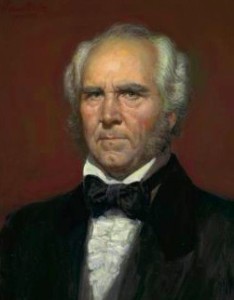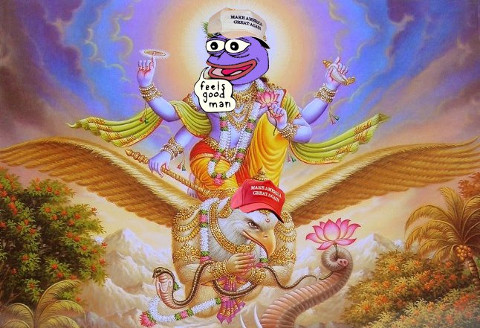– 12 September 2016 –
Janus:
 Some members of the Alt-Right are working to create a sort of religion based on Pepe the Frog as a manifestation of the ancient pagan god “Kek” or “Kuk“.
Some members of the Alt-Right are working to create a sort of religion based on Pepe the Frog as a manifestation of the ancient pagan god “Kek” or “Kuk“.
At first this idea seemed like some sort of joke or hyperbole, like the “God-Emperor Trump”, but the more I learn about this Alt-Right religion, the more serious it sounds.
So is this Kek religion just another Alt-Right joke, this time on a grand scale? Or does Kek represent something more serious and sinister? As with so much in the Alt-Right world, it’s difficult to tell.
From F. C. Stoughton’s article, “Toward an Alt-Right Religion“, via Counter-Currents:
We in the Alt Right tend to regard our internal religious debates as pointless and divisive; Atheist or Anglican or Asatru, we feel, target each other for denunciation or proselytization only to the detriment of our cause. Thus we often adopt a playful cynicism when dealing with the subject of religion so as to avoid intragroup strife and hurt feels. . . .
[. . .]
So what to do? What to believe? We would ask it this way: what do we want our beliefs to do? For the religion of the Alt Right, in all its forms, is refreshingly pragmatic.
We have already touched on the ramifications of collective belief: get everyone reading from the same script to consolidate your power, as Constantine knew at the Council of Nicaea and as ISIS knows today. And it is almost true to say that the Alt Right is only interested in religion insofar as it satisfies such political exigencies. But not quite: the social and political effects of a belief are a sum of its effect on individuals. The social cohesion elicited by shared belief is no good if it turns us, individually speaking, into sad robots, cowards, or cuckolds — which would, in turn, render the collective nothing to be particularly proud of.
So though any manner of collective worship may unify us, we refuse to be unified in self-defeat. We refuse to honor alien, universalizing gods who don’t honor us back, who appear to think that we are fungible with other individuals and peoples. We refuse to abase ourselves before a jealous god — it is we who should be jealous of a god who puts others before us. We condemn the migrant-loving, pathological altruism of the Current Year’s pope. We blast the Evangelical Israel-firsters of the pastor Hagee stripe. We scoff at notions of endemic, original sin (“white guilt” or “white privilege”) and their groveling atonements in the virtue-signaling cult of childless volunteers in the South Sudan. We reject even the belief in a personal savior who is supposed to have already done the work of squaring up our shortfalls with the divine — turning us into idle, passive observers, i.e. cucks. Any such shortfall we claim as effortspace for own great spiritual work.
Beyond that, we’re flexible. We would believe in the divinity of a smug green frog or real estate mogul if we thought he’d reward our affections by blessing us with virtù and hale prolificacy.
Stoughton sounds pretty serious. He seems to believe that the creation of a mysterious in-group religion will create cohesion within the Alt-Right. And he obviously has a problem with Christianity in general.
Atlantic Centurion admits to being at least half-serious when he describes Kek’s relationship to the Alt-Right movement:
And that is when things get interesting. When we know that the memes have taken on a superhuman will of their own that simply cannot be controlled. When we have entered the realm of meme magick, the occult world of metapolitical subversion. That is when we know we have born witness to an incarnation of the ancient Egyptian frog god of chaos, Kek, who expresses himself in our time to the youth of nation through meme magick, in the avatar of Pepe the Frog.

Nothing is too sacred for Alt-Right memes. Still, it’s one thing to accept a joke based on one’s most holy symbols and quite another to see those symbols used in serious pagan blasphemy. Does the Kek religion go too far?
[. . .]
So how does this become esoteric? Well, Kek is also an Ancient Egyptian pagan god. He is one of the eight primordial deities of the Old Kingdom, a god of darkness representing the unknown and chaos that come before the light. Moreover, in his male form he is depicted as a frog or a man with the head of a frog. Now, no one deliberately made the kek-yielding Pepe into Kek; it just kind of arouse out of the ether, which is what makes it so interesting. If one acknowledges the notion of cyclical time believed by the non-Semitic religions of the world, one can understand that the nationalist Pepe meme is a return of Kek the chaos-bringer, who may well represent Kalki the Destroyer, bringer of the end of the Dark Age.
Kek is the deity of chaotic meme magick, which is a form of metapolitical prayer and will-to-power. Metapolitics is the process of trying to change the culture and values of a society as opposed to pure political activism. And Pepe is a modern-day icon of Kek, who shitlords project their wishes unto and send icons of into the digital ether.
Memes are in their original definition things or phrases people believe in. So meme magick, essentially, is the repetition of memes enough to change the memes that other people believe in, or memeing something into reality. The meme becomes a mantra, something chanted to generate karma.
The explosive growth of Pepe, his association with the nationalist right, and his estrangement from the normies solidified his place in the esoteric tradition. The normies had tried to seize upon this avatar of Kek as a source of mindless and indifferent entertainment, but Kek reasserted himself as on the side of Truth and liberation through the chaos of meme magick. Thus, Pepe became inaccessible to the normies, for in rejecting the Truth they had rejected Kek, and could no longer try to lay claim to a “nazi frog meme.”
Apart from a strong desire to restore the primacy of white nations within white countries, and to fight our enemies on the Left, there is little that unites the people of the Alt-Right, particularly in their religious beliefs.
The diversity of religious and moral beliefs within the movement mirrors the fragmented, de-Christianized state of the West. Secularists, neo-pagans, atheists, and Christians of various stripes can all be found, as well as anti-Christians who believe that Christianity is an undesirable Jewish religion. Probably one can find believers of all the major religions within the Alt-Right.

Christians are willing to work with non-Christians as allies against common enemies. Such alliances have made the Alt-Right great. But expecting us to participate in pagan rituals, even half-seriously, goes too far.
Up to now, the Alt-Right has tried to put aside these religious differences in order to focus on the fight against our common enemies. This is a wise policy, and so far it has born considerable fruit.
So what possible benefit could arise from the Alt-Right’s creation of a pagan cult centered around Kek?
It’s hard to believe that a Kek cult would serve to unite the religiously diverse Alt-Right members.
On the contrary, I suspect this move could drive a deeper wedge between the Christians in the Alt-Right and the various non-Christians.
What kind of serious believer of any persuasion would set aside his faith in order to pay homage to an ancient pagan God? Maybe some of the neo-pagans, for whom one more resurrected pagan god could easily be grafted into the accepted pantheon.
But could a believing Christian do so? No, not even half-seriously.
Christians can fight for political movements or for the fate of our nations when such actions do not conflict with the ways of our Lord. We can ally politically with non-Christians and anti-Christians against common enemies. But when it comes to the worship of heathen gods, that crosses the line.
To outsiders, the promotion of a Kek cult will only make the Alt-Right seem more alien to Western values. Regular people can readily, if reluctantly, see the reality of gender and racial differences and the manipulations by Jews. But most “normies” will be repelled by the worship of a made-up pagan god.
By adopting this Kek religion, the Alt-Right will represent merely the latest rejection of the fundamental Christian heritage that built the Western nations into technological marvels and the rulers of the world. They will become just another anti-Christian group competing with other anti-Christian groups for cultural and political hegemony.
If the Alt-Right routinely condemns naval-gazing and autistic LARP’ing, why are they creating a fake religion when it serves no political purpose? If the Alt-Right is about taking the “red pill” and recognizing observable reality, then why promote a fake religion? It makes no sense at all.
This whole Kek thing seems like utter vanity and inward-focused self-worship. Perhaps someone can explain it to me.
Maybe I just don’t get the joke.
[Update: – 13 September – Lawrence Welk of Antlantic Centurion fame has responded to this article in the comments section. His response cuts to the chase pretty well, I think.]

 When of one mind, Janus' views
form a composite of his two main sides. He attempts to consider issues with care and thoughtfulness, though he remains biased towards Christianity and Western
traditions. Outsiders might call him a Conservative, but in fact he is a Fundamentalist in that he promotes the Christian values that raised Western civilization to its peak.
When of one mind, Janus' views
form a composite of his two main sides. He attempts to consider issues with care and thoughtfulness, though he remains biased towards Christianity and Western
traditions. Outsiders might call him a Conservative, but in fact he is a Fundamentalist in that he promotes the Christian values that raised Western civilization to its peak. Tending to sensationalize, and sometimes to hyperbolize, C. F. van Niekerk over-analyzes any number of subjects from mundane minutiae to the great philosophical questions of life itself.
Tending to sensationalize, and sometimes to hyperbolize, C. F. van Niekerk over-analyzes any number of subjects from mundane minutiae to the great philosophical questions of life itself. Katáxiros, the parched one, alone and adrift at sea, yet ever rowing ahead anyhow, sometimes weakly and sometimes vigorously, thirsting after God through the Orthodox Christian Church, contemplating the ways of the Lord, recognizing that while he is inadequate to the task, he must press ever ahead. Katáxiros writes about matters pertaining specifically to the Orthodox Church.
Katáxiros, the parched one, alone and adrift at sea, yet ever rowing ahead anyhow, sometimes weakly and sometimes vigorously, thirsting after God through the Orthodox Christian Church, contemplating the ways of the Lord, recognizing that while he is inadequate to the task, he must press ever ahead. Katáxiros writes about matters pertaining specifically to the Orthodox Church. We don't know what to make of the Wanderer. He walks in with the moon and rolls out with the wind. He uses no name; the smells of rank sweat, dirt, and smoke mark him as much as anything. He's always near, but never close. Heedless of human ideals and bounds, he stands unyielding for honor on the ground. He's practical to a fault when he's not romantic to even greater fault. He says little, but when he does finally speak, we listen up. The Wanderer is our lawman of final resort. By hook or by crook, he sees a job done, just don't ask how. Frankly, we're a little afraid of the Wanderer.
We don't know what to make of the Wanderer. He walks in with the moon and rolls out with the wind. He uses no name; the smells of rank sweat, dirt, and smoke mark him as much as anything. He's always near, but never close. Heedless of human ideals and bounds, he stands unyielding for honor on the ground. He's practical to a fault when he's not romantic to even greater fault. He says little, but when he does finally speak, we listen up. The Wanderer is our lawman of final resort. By hook or by crook, he sees a job done, just don't ask how. Frankly, we're a little afraid of the Wanderer. Diabolus, the devil's advocate. Sometimes we are tempted to embrace the evil world that we despise. Diabolus is there to encourage us in this folly. Fortunately a rare visitor here.
Diabolus, the devil's advocate. Sometimes we are tempted to embrace the evil world that we despise. Diabolus is there to encourage us in this folly. Fortunately a rare visitor here.











Lawrence Murray
/ 12 September 2016For someone concerned about paganism (and not necessarily equivalent anti-Christianity) on the Alt-Right, you have an interesting choice of site banner…
LikeLiked by 1 person
Janus
/ 13 September 2016That’s actually a pretty damned good point.
But my site’s banner doesn’t force me to worship a non-Christian deity. I’m just using it for my own political reasons.
Hmm.
So you’re saying, I guess, that the Kek religion is no different.
Okay.
I can buy that.
Thanks.
LikeLike
Rifleman III
/ 13 September 2016Reblogged this on .
LikeLike
Mark Citadel
/ 15 September 2016The kek stuff is a meme joke, fed into by a lot of spooky coincidences (the latest being an italo disco record from the 1980s by ‘P.E.P.E’ which features a frog casting magic spells on the vinyl sleeve). I take these things in good humor. It is degenerate, but then many people in the AltRight are degenerates, that is just the nature of a dissident zeitgeist. Good thing to acknowledge this.
LikeLike
Janus
/ 15 September 2016You’re right of course. If I’m not careful, I forget to take a step back, making it easy to become “autistic”, as they say. Plus it’s easy for traditionalist Christians these days to fall into the paranoid persecution mindset similar to those of our benevolent overlords. This article has a mild overdose of both situations. Still, I believe it would be wise for an involved Christian to remain wary of any active occult aspects of this movement.
LikeLike
AncillaryRhymes
/ 9 December 2016I think that you, and also perhaps followers of the Cult of Kek have slightly misinterpreted Keks spiritual significance.
Kek is not so much a deity representing chaos, but a deity who ushers form from chaos. Kek represents the time just before dawn, the time of the morning star that rises before the return of the sun.
When I look at the Cult of Kek, what I see is a delirious enthusiasm and a sense of invincible positivity.
LikeLike
Janus
/ 12 December 2016You might be right. I’m still confused on the whole Kek thing.
The Cult of Kek is palatable and quite funny as a joke or a game, or as a symbol to rally behind, and most people seem to address the subject of Kek in that fashion. And maybe the Cult even reaches the level of a half-serious, semi-exclusive in-group like the Freemasons.
But deep down a part of me feels that the entity of Kek is real and represents the rise of a power beyond human control, probably with interests that harm mankind in the long run (however satisfying it is to see our enemies confounded). So while I celebrate most of the tactics and goals of the Alt-Right, personally I distance myself from the Cult of Kek, even if it’s only half-serious, and choose instead to fight our enemies under the Lord of hosts.
I do thank you for explaining some of the spiritual significance that Kek represents. As I said, I’m pretty ignorant on the subject. If you’ve got more insights, I’m curious to hear about them.
LikeLike